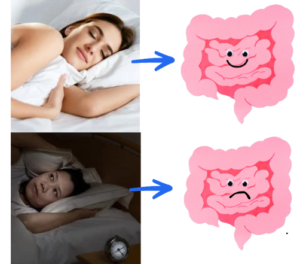Understanding the Vital Connection Between Quality Sleep and Digestive Health
Sleep serves a crucial function beyond mere rest; it is a fundamental biological process that profoundly impacts our digestive health. The intricate relationship between sleep and digestion encompasses a range of physiological processes that work in unison. The body's circadian rhythm, often referred to as the internal body clock, synchronises both sleep cycles and digestive functions. This alignment is evident in how individuals typically experience hunger at consistent times each day, illustrating the body's adept capacity to function in accordance with natural biological cycles.
The Indispensable Role of Restful Sleep in Promoting Digestive Health 
Sleep is essential for the body’s ability to heal, rejuvenate, and restore its systems. The deeper stages of sleep are particularly vital for these restorative processes. During these profound stages, the organs, tissues, and cells comprising the digestive system not only relax but also engage in critical repair mechanisms. The body prioritises cellular repair and growth during deep sleep, especially concerning the regeneration of the cells that line the digestive tract. These cells endure continuous wear and tear from exposure to food particles and digestive enzymes, making their regeneration crucial to maintaining the integrity of the gastrointestinal lining, thereby enhancing the effectiveness of digestion.
Deep sleep is also instrumental in strengthening the immune system, which is particularly important for the digestive system, as it contains specialised immune cells activated by the beneficial bacteria that reside in the gut. These immune cells play a critical role in safeguarding the gut and the entire digestive system from harmful microorganisms, ensuring a balanced population of bacteria within the gut ecosystem.
Moreover, the organs within the digestive system are pivotal in detoxification, facilitating the removal of waste and harmful substances from the body. Deep sleep enhances this detoxification process by optimising the efficiency of the liver and kidneys, allowing these organs to operate at their peak performance. The synergistic relationship between sleep and detoxification is a significant factor in promoting overall digestive health and wellness.
Investigating the Relationship Between Gut Motility and Sleep Patterns
A fundamental aspect of digestion is the effective movement of food and waste through the digestive tract, a process referred to as gut motility. This process undergoes significant changes during sleep. Throughout both deep and light sleep, the rate of gut motility is considerably reduced. This reduction occurs as a necessary adaptation, allowing the digestive system to conserve energy, which is then redirected towards repairing digestive tissues. By conserving energy in this manner, the digestive process is primed to function more effectively during waking hours, thereby optimising both nutrient absorption and waste elimination.
The migrating motor complex represents a series of contractions that occur during fasting periods, including during sleep. This cycle is essential for gut motility, as it efficiently removes food particles and residue that may linger in the digestive system. This natural cleansing mechanism of the digestive tract reduces the risks of bacterial overgrowth, fostering a healthy gut environment. Notably, the migrating motor complex is most actively engaged during the night when individuals are fasting and asleep, underscoring the critical role of sleep in maintaining the health of the digestive system.
As daybreak approaches, gut motility gradually increases, preparing the digestive system to efficiently process and digest food. This rise in motility can also trigger the first bowel movement of the day, exemplifying the finely tuned interplay between sleep and gut motility. Gaining insight into this connection is crucial for optimising digestive health and enhancing overall well-being.
Understanding Hormonal Interactions Affecting Sleep and Digestion
Ghrelin, commonly known as the hunger hormone, plays a significant role in stimulating appetite. In contrast, leptin signals to the brain that the stomach is full, assisting in preventing overeating. Collectively, these hormones are integral to appetite regulation, yet their functions can be negatively affected by insufficient sleep.
Even a single night of inadequate sleep can lead to elevated levels of ghrelin, which can heighten appetite and often provoke cravings for carbohydrates. This phenomenon is frequently described as feeling ‘hangry’. Compounding this dilemma, leptin levels can diminish after a night of insufficient sleep, disrupting signals that indicate fullness. This creates a challenging scenario where individuals may overeat and struggle to recognise their body's cues to cease eating. While occasional poor sleep may not have severe repercussions, chronic insomnia can lead to significant digestive issues, including gut inflammation, liver disorders, gastroesophageal reflux disease, inflammatory bowel disease, and even colorectal cancer, along with contributing to weight gain.
The Effects of Sleep Disruption on Digestive Health
Disruptions to sleep can lead to a range of digestive issues. Factors such as shift work, particularly night shifts, and experiencing jet lag can significantly disturb sleep patterns and throw off the body’s internal clock. Additionally, eating late at night or having irregular meal times can adversely affect the quality of sleep. The circadian rhythm that governs sleep is intrinsically linked to natural sunlight, which plays a vital role in maintaining a healthy sleep-wake cycle.
Regrettably, in today’s technology-driven society, many individuals find themselves spending the majority of their daytime indoors, resulting in diminished exposure to natural light. This shift has led to increased exposure to blue light emitted by devices such as laptops, televisions, and smartphones, further disrupting the sleep cycle and sleep patterns, particularly when this exposure occurs shortly before bedtime.
The cumulative effects of these factors can result in serious digestive issues, including diarrhoea, ulcers, inflammatory bowel disease, or disturbances in the delicate balance between beneficial and pathogenic bacteria in the gut. This imbalance can also compromise the integrity of the gut lining, exacerbating challenges related to digestive health.
Enhancing Microbiome Health Through Quality Sleep
The microbiome encompasses the trillions of microorganisms residing in the gut, primarily composed of beneficial bacteria known as probiotics, as well as viruses, fungi, and potentially harmful bacteria. These microorganisms are essential for not only overall health but also for digestive health. They bolster the immune response and aid in digestion, promoting the production of specific vitamins, enzymes, hormones, and amino acids. Recent studies have revealed a substantial connection between the microbiome and sleep, indicating that disrupted sleep or chronic insomnia can unfavourably affect the balance of these microbes, ultimately impacting digestive health and overall well-being.
Unpacking the Complex Interactions Between Microbiome Health and Sleep Quality
The interplay between sleep and microbiome health is intricate and multi-layered. Poor sleep can negatively impact microbiome health, while an imbalanced microbiome can also detrimentally affect sleep quality. To grasp this complex relationship, one study indicated a correlation between a higher abundance of certain bacterial types in the gut and quicker sleep onset, along with fewer night awakenings. Although this article cannot cover all findings, the essential takeaway is that nurturing a diverse and thriving population of beneficial bacteria in the gut is pivotal for achieving optimal sleep, effective digestion, and overall health maintenance.
Investigating the Interconnections Between Stress, Sleep, and Digestive Well-being
A common result of stress and anxiety is disrupted sleep. Conversely, these mental health challenges can also negatively affect the physical health and functioning of the digestive system. Such disruptions can lead to altered gut motility and contribute to complications such as indigestion, ulcers, and irritable bowel syndrome. A key factor in this dynamic is the impact of the so-called stress hormone, cortisol.
The Influence of Cortisol on Digestive Processes
When cortisol levels rise, the body enters a fight-or-flight state. This physiological reaction causes blood flow to be redirected to vital areas such as the heart, brain, lungs, and muscles while reducing flow to the digestive system. This response prepares the individual to either confront danger or escape, a reaction that was crucial for survival in prehistoric environments.
In modern circumstances, however, stressors are often less life-threatening, such as financial pressures, work-related stress, or inadequate sleep. While short-term redirection of blood flow may be beneficial in acute scenarios, chronic stress can have detrimental effects on the digestive system, particularly concerning gut motility. This can manifest in symptoms including constipation, diarrhoea, indigestion, gas, and bloating. Therefore, adopting effective stress management techniques is essential for supporting both gut health and achieving quality sleep.
Ensuring adequate sleep is crucial for maintaining a healthy digestive system, as the relationship between sleep and digestion is inherently interconnected. Prioritising effective sleep hygiene practices is vital for achieving restorative sleep. This includes reducing exposure to blue light from electronic devices, adhering to a consistent sleep schedule, creating a cool, dark sleeping environment, refraining from food intake within two hours before bedtime, and ensuring exposure to natural light during the day, especially in the morning.
References
Understanding Digestive Health and Circadian Rhythms
Exploring Sleep Dysfunction and Digestive Conditions
Examining the Link Between the Gut Microbiome and Sleep
Investigating Stress and Its Effects on the Digestive System
The Article: How Sleep Affects Your Digestive System appeared first on https://janestevensnutrition.com
The Article: Sleep’s Impact on Your Digestive System Explained appeared first on https://janestevens.net
The Article Sleep’s Impact on Digestive Health Explained Was Found On https://limitsofstrategy.com


This post really sheds light on an often-overlooked aspect of our health! It’s fascinating how intertwined sleep and digestive health truly are. I’ve personally experienced the negative effects of poor sleep on my digestion, particularly after late nights or irregular sleep patterns. It’s as if my body sends out a distress signal, reminding me that these systems are working together in such delicate harmony.